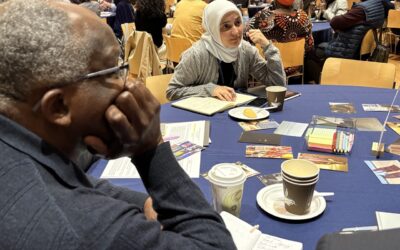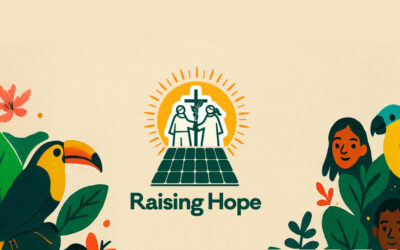
Participants in the 50 th International Eucharistic Congress (C) CSC Media
There has been much expectation surrounding these days in Ireland, but probably no one expected the first day of the congress to have such an ecumenical tone. Yet, it has been one of the most interesting aspects of this 50th International Eucharistic Congress (Dublin, 10-17 June 2012) that has been promoted by the Catholic Church, but also – becuase of its main theme of communion – involves and openness to dialogue with all the baptized.
Already during preceeding days, during the Theological Symposium (Maynooth, 6-9 June 2012), ecumenical dialogue had entered the field in a similar context. Leaders of several Churches, including Metropolitan Emmanual (Adamakis) from France; President of the European Conferences of Churches; and Cardinal Koch, President of the Pontifical Council for the Promotion of Christian Unity, spoke precisely about the ecumenical vision of the relationship between Eucharist and ecclesical communion.
 The presentation of Maria Voce one of the speakers at the event, was framed within this same context. Her presentation was proceeded by that of Brother Alois, the Prior of Taize who, recalling the story of Brother Roger Schutz, founder of the Community, underscored how “the passion that fills their hearts” is precisely the call to work without ceasing for “the unity of the Body of Christ”. He was followed by Reverend Jackson, Anglican Archbishop of Dublin, with the Liturgy of Water and Word, recalling our common baptism.
The presentation of Maria Voce one of the speakers at the event, was framed within this same context. Her presentation was proceeded by that of Brother Alois, the Prior of Taize who, recalling the story of Brother Roger Schutz, founder of the Community, underscored how “the passion that fills their hearts” is precisely the call to work without ceasing for “the unity of the Body of Christ”. He was followed by Reverend Jackson, Anglican Archbishop of Dublin, with the Liturgy of Water and Word, recalling our common baptism.
Maria Voce’s presentation on “Communion in one baptism” were testimonial in style, beginning from her own experience of the Gospel, which began when she was a young student in Law School. She had been fascinated by other young people who had found their fulfillment in living the Words of Jesus. This experience had begun with Chiara Lubich in 1943, and had drawn in millions of others from around the world in the rediscovery of those fascinating words. Citing Luther, Maria Voce recalled: “We must be certain that our soul can do without anything, except the Word of God.” The Word transformed into life, giving witness.
Maria Voce experienced it directly during the ten years she spent in Turkey, a land with few external signs of Christianity, but one where she was able to “experience the beauty of the family that Jesus came to create on earth.” In the 70 years of the Focolare she saw how this typically communitarian and ecumenical spirituality joins those who live it in such a way that they feel like on Christian people. It is a dialogue of life: “Positions and even the most advanced agreements among theologians are not enough, if the people are left unprepared,” Maria Voce affirmed, and she even dared to say: “United by this spirituality, we would like to be leaven among all the Churches and to contribute to accelerating their journey toward the full and visible communion, including Eucharistic Communion”.
Cardinal Ouellet, who had been sent by Benedict XVI as his representative at the Congress, also affirmed that the future of the Church passes through her witness of unity and her dialogue with all humanity. Diarmuid Martin, the Archbishop of Dublin and President of the Congress offered a word to the Irish youths, adding that “the Church in Ireland is on a path of renewal.”
The ecumenical day (11 June 2012) continued with a series of workshops. Among them was: “The dialogue of life in a new phase of ecumenism”. It was conducted by Renate Komorek from the Focolare Movement, and included various guests: Rev. Bronwen Carling, Anglican; two presidents from Northern Ireland, from a Protestant school and from a Catholic school, who have had a long history of collaboration; members of the Arche Community of Corrymeela and people from the Charismatic Community.
Wandering among the stands at the Royal Dublin Society, among 20,000 visitors who have been here over these days, brings to mind the “strength” that keeps us together; to use the words of Maria Voce: “Living in mutual love, which permits the presence of Jesus among two or more Christians who are united in his name. Jesus between a Catholic and an Anglican, between an Armenian and a Lutheran. . . This is how the Church, in a certain sense, passes beyond the confines of church buildings and, in the full communion among all, draws closer to the humanity of today in order to respond to the needs and the questions with answers that only the Gospel can give”.
By our correspondent Maria Chiara De Lorenzo
For more on the Eucharistic Congress see:
The genetic code of communion da Città Nuova online
Report of Maria Voce’s testimony at IEC2012, Monday June 11, 2012 | Download pdf



0 Comments